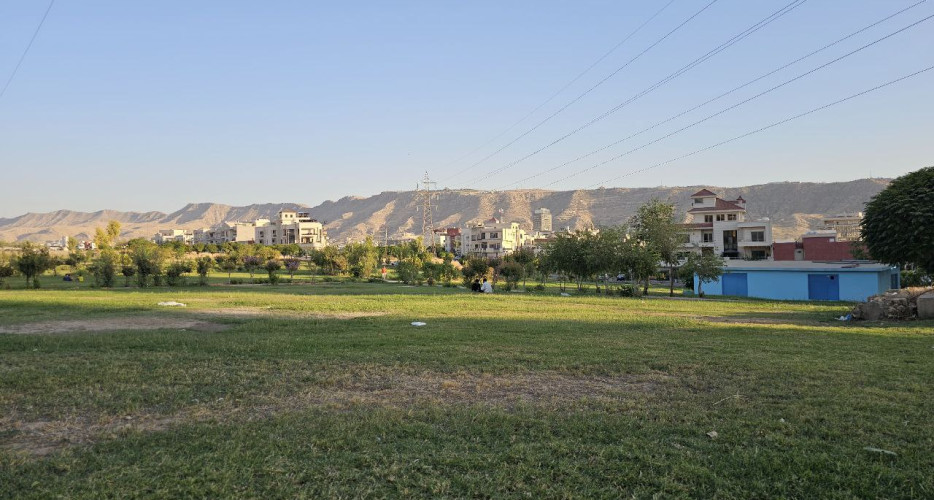
Peregraf– Ammar Aziz
Despite growing concerns about climate change and environmental pollution, Duhok governorate continues to lag behind other parts of the Kurdistan Region in expanding its green space. According to official statistics, Duhok’s percentage of green coverage remains the lowest compared to Erbil and Sulaymaniyah, raising criticism from environmental activists.
A 2015 survey conducted by the Kurdistan Region’s Ministry of Agriculture, endorsed by the Environment Board, put green space levels at 9.05% in Erbil, 9.1% in Sulaymaniyah, and 12% in Duhok. A decade later, new figures show significant growth in Erbil and Sulaymaniyah, which now stand at 19.8% and 19.6% respectively, while Duhok has reached just 13%.
Activists Call for Large-Scale Campaigns
Bakhtiar Zebari, an environmental activist from Duhok, told Peregraf that the city has failed to implement major tree-planting campaigns in recent years.
"Since 2014, no extensive projects have been carried out to increase green areas in Duhok. Planting a few hundred or even a few thousand trees makes little difference," Zebari said. "For real change, Duhok should commit to planting at least 100,000 trees in a single year. Only large-scale efforts can raise the percentage to meaningful levels."
He added that two new parks under construction could increase Duhok’s green space to 14%, but the city would need at least 10 additional large parks to reach 20%.
Zebari also warned that the rapid expansion of housing projects, rising pollution from generators and oil refineries in the Kwashi area, and a growing population have all worsened environmental conditions in the governorate.
Municipality Acknowledges Shortcomings
Sherwan Hassan, spokesperson for Duhok Municipality, confirmed the official figure of 13% green coverage, noting that two parks under development should soon push the number slightly higher.
"The percentage is indeed low and needs to be increased," Hassan admitted. "However, in some neighborhoods built during the Ba’ath regime, there is simply no land left to create new parks. We currently have 5 to 6 large parks and more than 50 gardens across the city. There are also plans to plant trees on the two mountains flanking Duhok, but this remains under discussion."
Environmental Standards and Health Risks
Global warming has led international organizations to raise the minimum standard for urban green space from 15% to 25%. Experts warn that failure to meet this benchmark increases the risks of pollution-related illnesses.
"Environmental pollution is one of the main causes of cancer and childhood diseases in the Kurdistan Region," said Mohammed Taher Brifkani, former director of Duhok’s Environment Department. "Guidelines require that 10% of land in a gas station project and 30% in tower projects be allocated for green space, but enforcement is weak."
Brifkani also stressed that illegal oil refineries in the Kwashi area remain a major obstacle. "Despite dozens of government decisions to close them, they continue to operate, polluting the air and harming public health."
Erbil Expands Green Belt Initiative
While Duhok struggles to keep pace, Erbil has launched ambitious new projects. Governor Omed Khoshnaw recently announced the Erbil Green Belt Project, which will see the planting of seven million olive and pistachio trees around the city. The project also includes the construction of 10 water retention ponds to support sustainability.
Officials estimate the initiative will reduce up to 210,000 tons of carbon dioxide annually, lower city temperatures, combat desertification, and create hundreds of agricultural jobs.
Alongside the Green Belt, Erbil is developing five new public parks covering nearly 200 acres, with tens of thousands of trees being planted across the city.
"Projects like these will protect the environment and improve the quality of life for residents," Khoshnaw said.
The Road Ahead
Duhok’s slow progress highlights the urgent need for stronger environmental policies and investments. Activists argue that without large-scale and sustained efforts, the city will fall further behind regional and international standards.
As climate change accelerates, the gap between Duhok and its neighboring governorates underscores the importance of prioritizing green development—not only to beautify cities, but to safeguard public health and ensure sustainable urban growth.